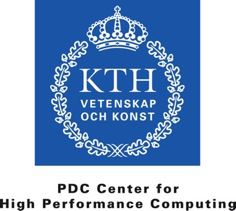parallel processing on CPUs and GPUs. He is
currently an assistant professor at Uppsala University looking at parallel
programming systems and runtimes.
Björn Engquist is professor in mathematics at University of
Austin, Texas. Formerly, he has had
similar positions at Princeton
University and the University of California, Los Angeles. Professor Engquist is
also a professor of Numerical Analysis and Computing Science at the Royal
Institute of Technology in Stockholm (KTH) since 1992. He received his B.S. in
1966 and the Ph.D. in 1975 from Uppsala
University, Sweden.
Between 1966 and 1985, he held positions at the Courant Institute, the
University of California at Berkeley, Stanford University, and Uppsala University.
He is the chairman of KTH Center for Computational Science and Engineering
and former director of Parallel and Scientific Computing Institute (PSCI) at KTH
and Uppsala University and the Center for Parallel Computers (PDC), KTH. His
principal research interests are the mathematics and algorithms of scientific
computing.
Thomas
Ericsson is working at Chalmers University of Technology. He is
an expert in high-performance computing and numerical analysis, in
particular in numerical linear algebra.
Erik
Hagersten Uppsala University, teaches courses in computer architecture.
His research
focus is "Increase data processing speed
through adopting architectures and [coherent] data replication." He works in
both academia and industry in Sweden and the US, and has initiated a
collaborative research program between Uppsala University and Sun's
Engineering in the U.S.
<span <><br <>
</br <></span <>
Erwin Laure is the director of PDC-HPC. Before
joining PDC in 2008 he was the Technical Director of the EU funded project
"Enabling Grids for E-Science in Europe (EGEE)" working at the European
Organization for Nuclear Research (CERN). After joining CERN in 2002 he
worked on data management issues within the EU DataGrid (EDG) project,
became the Technical Coordinator of EDG, and coordinated the middleware re-
engineering activities in the first phase of EGEE. He holds a PhD in Business
Administration and Computer Science from the University of Vienna, Austria.
His research interests include grid computing with a focus on data management
in grid environments as well as programming environments, languages,
compilers and runtime systems for parallel and distributed computing.
Pekka Manninen is an Applications
Analyst at Cray Inc. He works with performance analysis and optimization of
Cray system users' applications, and conducts R&D on exascale programming
models and tools. Before joining Cray he was working in various functions at
CSC, the national supercomputing center in Finland. He received his Ph.D. in
theoretical physics in 2004 and holds a position of an adjunct professor at the
University of Helsinki.
<span <>
</span <>
Stefano Markidis is a postdoctoral fellow
at HPCViz dpeartment at KTH. He received a MS degree from Politecnico di
Torino and a PhD degree from University of Illinois at Urbana-Champaign. Before
joining PDC-HPC, he worked as researcher at the Los Alamos National
Laboratory, Lawrence Berkeley National Laboratory, and as capita selecta
professor at the Catholic University of Leuven. He received an R&D100 award as
part of the developer team of the CartaBlanca code. At PDC-HPC he is part of
the CRESTA EC-FP7 project to investigate the suitability of new programming
models to the next generation supercomputers. His research interests include
the investigation of novel programming models for HPC, and innovative
algorithms for parallel computing.
<br <>
</br <>
Michael Schliephake started working at PDC in
January 2010. As a system administrator, he is concentrating on the operation
of PDC's HPC computer systems. After spending several years as a software
developer creating engineering software, he began working in the area of HPC at
the High
Performance
Computing Center Stuttgart. There, Michael gained experience in the
installation and operation of cluster systems as well as in several projects which
were associated with the design and implementation of supercomputing and
grid infrastructures. These projects were the German D- Grid Initiative and the
European projects DEISA and PRACE. Furthermore, he brings with him his past
experience educating students in HPC. Michael obtained his qualified engineer
degree at the Technical University Leipzig.

